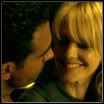Post by Naj on Feb 16, 2007 12:32:29 GMT -5
Possible Spoilers for 2/18 episode
.
.
.
.
.
.
.
.
.
.
Dylan tunes can't
heat up 'Cold Case'
It would be almost impossible to create a bad TV drama when your soundtrack is eight Bob Dylan songs like "Positively Fourth Street" and "Simple Twist of Fate."
It is, however, possible to make one that feels lame and false, a feeling that sadly arises too often during the new "Cold Case" titled "Blood on the Tracks."
"Cold Case" has built shows around the music of important artists before. But whereas the Bruce Springsteen show had some clever turns, the Dylan show devolves from a potentially interesting look at the corrosive effect of guilt into a series of superficial clichés about Vietnam war activists.
The cold case in question goes back to 1981, when a young suburban couple died in an apparent gas-line explosion at their home.
Years later, workers find evidence they were really blown up by a bomb, which leads Lilly (Kathryn Morris) to poke into their serene lives.
She starts with a circle of early-'70s college friends who at first seem to have walked right in from "The Big Chill."
But they have a secret. Their antiwar activism included setting off bombs, one of which blew up one of their fellow plotters in 1971. Somehow no one ever connected his death to other group members, though many of them showed up in police surveillance of the radical group to which they were connected.
So the others went on with their lives. But by 1981, one group member found this death weighing so heavily on his conscience that he told the others he was going to confess - which, of course, could send them to jail.
Twenty-four hours later, boom, he also was dead.
As Lilly and her team sort this out, they find an arrogant, evasive and rather unpleasant group that long ago traded idealism for comfortable success.
Setting all this to Dylan music might sound natural, since these folks certainly would have played it. But by the early '70s, Dylan wasn't anywhere near this world. So the plot linkage, like the title of the show, seems forced.
When one character gets drunk and rides his bike naked in the street wearing a Ronald Reagan mask, then quotes "Ballad of a Thin Man" ("Something is happening here and you don't know what it is, do you, Mr. Jones?"), it feels like a cartoon. Naming the character Zimmerman, Dylan's birth name, doesn't add to the synergy.
Nor does naming other characters after figures from Dylan's songs and life, like Johanna and Sara.
To be fair, building a linear script on Dylan's multilayered songs is a near-impossible task. Nor is the theme of sin and repentance without its intriguing, Dylaneseque moments.
But in the end, the characters aren't as interesting as the songs to which they listen.
Originally published on February 15, 2007
Article
.
.
.
.
.
.
.
.
.
.
Dylan tunes can't
heat up 'Cold Case'
It would be almost impossible to create a bad TV drama when your soundtrack is eight Bob Dylan songs like "Positively Fourth Street" and "Simple Twist of Fate."
It is, however, possible to make one that feels lame and false, a feeling that sadly arises too often during the new "Cold Case" titled "Blood on the Tracks."
"Cold Case" has built shows around the music of important artists before. But whereas the Bruce Springsteen show had some clever turns, the Dylan show devolves from a potentially interesting look at the corrosive effect of guilt into a series of superficial clichés about Vietnam war activists.
The cold case in question goes back to 1981, when a young suburban couple died in an apparent gas-line explosion at their home.
Years later, workers find evidence they were really blown up by a bomb, which leads Lilly (Kathryn Morris) to poke into their serene lives.
She starts with a circle of early-'70s college friends who at first seem to have walked right in from "The Big Chill."
But they have a secret. Their antiwar activism included setting off bombs, one of which blew up one of their fellow plotters in 1971. Somehow no one ever connected his death to other group members, though many of them showed up in police surveillance of the radical group to which they were connected.
So the others went on with their lives. But by 1981, one group member found this death weighing so heavily on his conscience that he told the others he was going to confess - which, of course, could send them to jail.
Twenty-four hours later, boom, he also was dead.
As Lilly and her team sort this out, they find an arrogant, evasive and rather unpleasant group that long ago traded idealism for comfortable success.
Setting all this to Dylan music might sound natural, since these folks certainly would have played it. But by the early '70s, Dylan wasn't anywhere near this world. So the plot linkage, like the title of the show, seems forced.
When one character gets drunk and rides his bike naked in the street wearing a Ronald Reagan mask, then quotes "Ballad of a Thin Man" ("Something is happening here and you don't know what it is, do you, Mr. Jones?"), it feels like a cartoon. Naming the character Zimmerman, Dylan's birth name, doesn't add to the synergy.
Nor does naming other characters after figures from Dylan's songs and life, like Johanna and Sara.
To be fair, building a linear script on Dylan's multilayered songs is a near-impossible task. Nor is the theme of sin and repentance without its intriguing, Dylaneseque moments.
But in the end, the characters aren't as interesting as the songs to which they listen.
Originally published on February 15, 2007
Article
















 . Hope like many critics this one is only overreacting and the ep won't be so bad...
. Hope like many critics this one is only overreacting and the ep won't be so bad... ..........
.......... ..........
.......... ...........
...........



 ~but it ain't about the music, it's about the DRAMA!!~
~but it ain't about the music, it's about the DRAMA!!~ 
